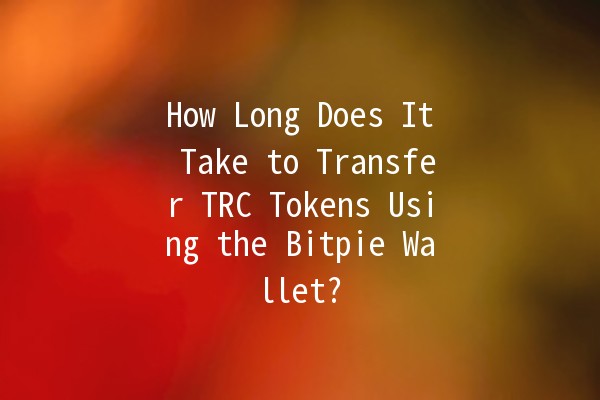
The Bitpie wallet has gained significant traction in the cryptocurrency community, especially for users interested in transferring TRC tokens. TRC tokens are built on the TRON blockchain and offer various functionalities ranging from decentralized applications to financial services. One of the crucial aspects that users inquire about is the time it takes to transfer these tokens using the Bitpie wallet.
In this article, we will explore the factors that influence the transfer duration, provide tips for optimizing transfer times, and address commonly asked questions regarding TRC token transfers.
Understanding TRC Token Transfers
TRC tokens operate within the TRON ecosystem, and their transfers typically occur without the delayed confirmation times that sometimes plague other blockchain networks. However, there are still several factors affecting the speed of transfers, including network congestion, transaction fees, and wallet settings.

Network congestion occurs when there are too many transactions seeking to be processed at the same time. When this happens, the blockchain may slow down, leading to delayed transfers.
Example:
If hundreds of users are attempting to send TRC tokens concurrently, the network can become bogged down. To ensure prompt processing, it’s advisable to check TRON network activity before initiating a transfer.
Transaction fees can influence the processing time of your transfer. Higher fees often incentivize miners to prioritize your transaction over others with lower fees.
Example:
When transferring 100 TRC tokens, you might choose to pay a fee of 0.1 TRON for immediate processing instead of the minimum, which could take longer to get confirmed. This is particularly relevant during periods of high activity on the network.
The configuration settings of your Bitpie wallet can also impact how quickly your transactions go through. It’s important to ensure that you are using the latest version of the wallet and that all your settings are optimized for the best performance.
Example:
If your wallet is set to validate transactions at a lower priority to save on fees, it may take longer for the transfer to complete.
Choosing the right time to initiate a transfer can significantly affect how quickly it is processed. Offpeak times tend to experience less congestion.
Example:
Transferring TRC tokens early in the morning or late at night in UTC may yield faster transactions compared to peak hours when more users are active.
Occasionally, technical problems with the wallet or the TRON network can introduce delays. Keeping your wallet updated and checking for service disruptions can mitigate these issues.
Example:
If Bitpie is undergoing maintenance or updates, you may experience delays in transaction processing. Always check for announcements regarding system maintenance prior to making transfers.
Practical Tips for Optimizing Transfer Speed
To enhance the efficiency of transfers, consider the following actionable strategies:
Regularly check TRON’s network status on dedicated platforms like TRONScan. Being aware of the current state can help you determine the best time for transactions.
Adjusting your wallet to prioritize transactions can have an immediate effect on transfer times. Ensure that variable fees are set according to the current demand of the network.
Most wallets, including Bitpie, provide recommendations for transaction fees based on current network conditions. Following these recommendations can help ensure faster processing.
If available, opt for features that enhance transaction speeds. Some wallets offer a "fast confirmation" option that uses higher fees to secure priority processing.
If possible, make transfers during known periods of lower activity on the blockchain. This could save you time and effort in troubleshooting delays.
Frequently Asked Questions
Several factors can impact the speed of TRC token transfers, including network congestion, transaction fees, your wallet configuration, and the timing of your transaction. To optimize speed, choose higher fees, utilize fast confirmation features, and stay updated on the network status.
Transaction fees serve as incentives for miners to prioritize certain transactions. Higher fees typically lead to quicker confirmations, especially during congested periods. Paying a competitive fee can ensure your transaction is processed more rapidly compared to others with standard fees.
Yes, your wallet’s settings can influence transaction speed. For instance, if your wallet is set to use minimum fees or lower priority, this may result in slower processing times. Check your settings regularly to ensure they are set for optimal performance.
Yes, transferring TRC tokens during offpeak times, such as early mornings or late evenings in UTC, can often yield faster processing due to reduced network congestion.
If your transfer is delayed, first check the transaction status using a TRON block explorer to see if it’s been processed or is still pending. If there are issues, consider whether the network is congested or if there were insufficient fees.
Once a transaction is broadcasted to the blockchain, it cannot be canceled or reversed. Always doublecheck details before initiating a transfer to avoid irreversible mistakes.
By following the outlined strategies and understanding the factors that influence TRC token transfer times, users can make informed decisions and optimize their experience with the Bitpie wallet. Whether you’re sending tokens for personal use, business transactions, or investments, staying informed and prepared will enhance your efficiency in managing TRC transfers.

